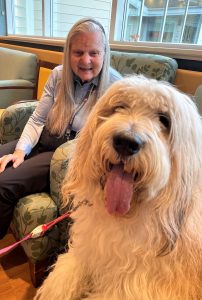
Stella knows how to make an entrance. Truly ‘man’s best friend’, the St. Berdoodle is something of a celebrity at Courtyards on Eagleson in Kanata, Ontario
Lifestyle Director Bethany Laughton has been bringing the 6-year-old Saint Bernard-poodle cross to work every Tuesday for the last 5 years. Friendly, intelligent, and calm, Stella is the perfect companion dog. Residents love to take Stella on supervised walks, pet her, watch her do tricks, and play chase.
“We have several residents whose complete state of being changes when they see Stella,” says Laughton. “She brings an instant smile to 99% of people who see her, and the other 1%’s reaction is ‘wow. Even the staff love her visits”.
Many people enjoy the companionship of a dog or cat, but the benefits can be even greater for seniors and seniors with dementia. Simply put, pets improve the lives of senior citizens in a number of different ways. Read to find out some of the surprising benefits that form the foundation of our pet-friendly buildings.
How do pets benefit older adults?
 Pets encourage physical activity
Pets encourage physical activity
After her move to a retirement community, Elizabeth, 64, was finding it difficult to continue engaging in physical activity. Until Stella walked through the door.
“Elizbeth brightens as soon as she sees Stella”, says Licy Panes, Health and Wellness Director at the memory care home. “She loves to walk her, holding the leash with a smile on her face.” The visits have translated into more movement and engagement overall.
Pet owners and people who interact with dogs or cats are more likely to engage in regular physical activity. A study conducted by Michigan State University found that people who interacted with dogs were 34 percent more likely to meet benchmarks on physical activity and are more active in general.
For seniors with Alzheimer’s or dementia, even gentle physical activity, like brushing their coat or giving a treat, uses fine motor skills and can help reduce agitation, increase engagement, and improve their ability to sleep at night.
Socialization may be easier with an animal
Pets provide their owners with more than companionship. Animals get conversation started.
Research shows that older adults who walk pets around communities become more social, speaking with their neighbors and individuals more frequently. After all, it is easier to start conversations with others when animals are around – simply start talking about the pet!
The increased socialization can lead to human-to-human friendships from which older adults derive tangible forms of social support, both of which are good for long-term health.
Animals make people happier

Research has shown that simply petting a dog lowers the stress hormone cortisol, while the social interaction between people and their dogs actually increases levels of the feel-good hormone oxytocin (the same hormone that bonds parents to babies).
Animal-assisted interventions offer mental health benefits that are especially important for those with cognitive impairment. In fact, those who participate in pet therapy report lower levels of anxiety, fear, and depression.
“Residents who normally aren’t active see a dog and are suddenly getting up, petting, and talking to the dogs, smiling and interacting,” explains, Danielle Jamieson, Regional Director of Health and Wellness at Sturgeon Creek in Winnipeg. “For residents like Charles, having a visit with Buddy makes his day. His face lights right up and he smiles the whole time!”
Pets ease the perception of pain

A 2012 study published in Pain Magazine found that therapy dogs provided “significant reduction in pain and emotional distress for chronic pain patients.” In fact, two in five seniors who live alone (43%) and 46% of those in fair or poor physical health reported that their pets help take their mind off pain.
This may be in part due to a boost of the feel-good oxytocin hormone in the brain, something that happens after five minutes of gazing into your pooch’s eyes!
Pets help seniors stick to a routine
For many people, retirement is a chance to finally do things they’ve always wanted. But this extra time can be a mixed blessing for retire. Owning a pet or caring for a critter can help older adults keep to a routine, provide a sense of purpose, and keep the mind sharp. Even for those who don’t own a pet, volunteering at an animal shelter or helping out with a neighbour’s pet can provide the same benefits.
Animals are good for your heart
Owning a pet may help maintain a healthy heart, especially if that pet is a dog. Numerous studies have explored the relationship between pet (primarily dog or cat) ownership and cardiovascular health, with many reporting beneficial effects, including increased favorable lipid profiles, and lower blood pressure. The reason? Dog owners are more likely to be physically active, eat better, are less likely to smoke, and have lower blood sugar than non-pet owners.
 Pets positively affect seniors living with dementia
Pets positively affect seniors living with dementia
Dogs like Stella and Buddy provide comfort and unconditional love wherever they go. Their very presence can help reduce the effects of dementia, like anxiety, agitation, irritability, depression, and loneliness. With their friendly presence, pets can help people be more interactive, more active, and more engaged.
Some seniors with more severe impairments will also benefit from visual, tactile and auditory stimulation by being with the animal. The interaction also promotes cognitive stimulation when they speak to pet handlers about the animals, history, origins, and engage in reminiscence.
Robotic Pets Bridge Gaps
They don’t have claws, don’t need to be fed, and are very portable. Robotic pets are toy animals that have life-like qualities including sound and movement.
For some seniors living in assisted living and memory care, live animals may not be a realistic option. At Chapel Hill Retirement Residence in Orléans, Ontario, robotic pets are included on the sensory cart. Used to engage seniors living with memory impairment, like real pets, the robotic animals promote spontaneous interaction between staff and seniors. They spark conversation and memories, reduce stress, and improve feelings of well-being.
Pet-Friendly Retirement Communities
According to an article published in Psychology Today older adults with pets may delay moving to a retirement community, thinking they might have to give up their animal companion.
At All Seniors Care, we believe that having animals around adds an extra dimension to a community – pet-friendly retirement homes encourage residents to keep the companions they love. If you are looking for an integrated community where you or your loved one can gracefully age in place, contact us to ask about our memory care in Stratford, seniors living communities in Calgary, assisted living in Winnipeg, retirement homes in Ottawa, and more.
Ask about our innovative BLOSSOM programs, designed to provide an extra sense of security and belonging for older adults in the early stages of memory decline.
Writer – Julianna McLeod
Julianna is a health and wellness expert at All Seniors Care. Her mission is to create content that empowers seniors to form sustainable solutions for lasting health and happiness. She is an experienced writer, editor, and Recreational Therapist living in Toronto.
